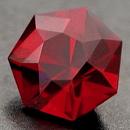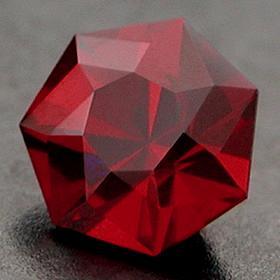|
|
||||||||||||||||
|
||||||||||||||||
|
||||||
|
|
|
|
Pyrope
(variety
of Garnet) |
|
| | |
| Discovered in 1803; IMA status: Valid (pre-IMA; Grandfathered) | ||
|
| ||
|
Chemistry |
|
|
| |
|
Mg3Al2(SiO4)3 | |
|
|
Magnesium Aluminum Silicate |
|
Molecular Weight: |
403.13 gm |
|
Composition: |
Magnesium |
18.09 % |
Mg |
29.99 % |
MgO |
|
|
Aluminum |
13.39 % |
Al |
25.29 % |
Al2O3 |
|
|
Silicon |
20.90 % |
Si |
44.71 % |
SiO2 |
|
|
Oxygen |
47.63 % |
O |
|
|
|
|
|
100.00 % |
|
100.00 % |
= TOTAL OXIDE |
|
|
|
||||
|
Classification |
|
|
| |
|
Silicates (Germanates) | |
|
8/A.08-10 | |
|
|
9 : SILICATES (Germanates)
|
|
Related to: |
Garnet Group. Almandine-Pyrope Series. Knorringite-Pyrope Series. Pyrope-Grossular Series. |
|
Members of Group: |
Garnet Group: Almandine, Andradite, Grossular, Pyrope, Spessartine, Uvarovite |
|
Varieties: |
Chromian Pyrope, Rhodolite, Titanian Pyrope |
|
Synonyms: |
Arizona Ruby, Bohemian Garnet, Böhmischer Granat, Cape Ruby, Colorado Ruby, Elie Ruby, Greenlandite (of Klaproth), Pyrope Garnet, Vogesite |
|
|
|
|
Crystal Data |
|
|
|
|
|
Subhedral to euhedral crystals, showing the dodecahedron or trapezohedral forms, to 20 cm; also granular, massive. |
|
|
None |
|
|
|
|
|
Physical Properties |
|
|
|
|
|
None |
|
|
Conchoidal |
|
|
Brittle |
|
|
7.0 - 7.5 |
|
|
3.582 (g/cm3) |
|
|
None |
|
|
Not Radioactive |
|
|
|
|
|
Optical Properties |
|
|
|
|
|
Purple-red, pinkish red, red-orange, deep red to almost black; colorless to pink in thin section. |
|
|
Transparent to Translucent |
|
|
Vitreous |
|
|
1.714 Isotropic |
|
|
0.000 (Isotropic) |
|
|
0.022 |
|
|
None |
|
|
|
|
|
Occurances |
|
|
|
|
|
Geological Setting: |
In ultramafic rocks, as peridotites, kimberlites, eclogites, serpentinites, and in "hornblende"-garnet-plagioclase rocks and anorthosites. Also in amphibole and biotite schists, and as a detrital mineral. |
|
Common Associations: |
Ilmenite, Phlogopite, Olivine, Hornblende, Plagioclase, Diamond, Kyanite, Rutile, Chlorite, Titanite, Glaucophane, Omphacite |
|
Common Impurities: |
Fe, Mn, Ca |
|
Type Locality: |
Czech Republic |
|
Year Discovered: |
1803 |
|
View mineral photos: | |
|
|
|
|
More Information |
|
|
|
|
|
| |
|
|
|
|
Some Pyropes show an interesting color change. Material from one location in Norway is wine red in incandescent light and violet in daylight. Some Pyrope from the Umba Valley in East Africa are Pyrope-Spessartines that are greenish blue in daylight and magenta in tungsten light. Distribution: Widespread. The following localities have all produced substantial amounts of gem material. Around Merunice (Meronitz), Czech Republic. Immense crystals in the Dora-Maira massif, Parigi, near Martiniana Po, Piedmont, Italy. In Germany, from Zöblitz and Greifendorf, Saxony. From South Africa, especially at the diamond mines around Kimberley, Cape Province. Along the Umba River and in the Pare Mountains, Tanzania. In the USA, at Masons' Mountain, near Cowee Creek, Macon County, North Carolina, and from Buell Park, near Fort Defiance, Apache County, Arizona. In Australia, 20 km from Bingara, New South Wales, and at Proston, Anakie, and Ruby Vale, Queensland. From San Martin and Quines, San Luis, Argentina. At Gravata, Pernambuco, Brazil.
|
|
|
||||||||||||||||||||||||||

